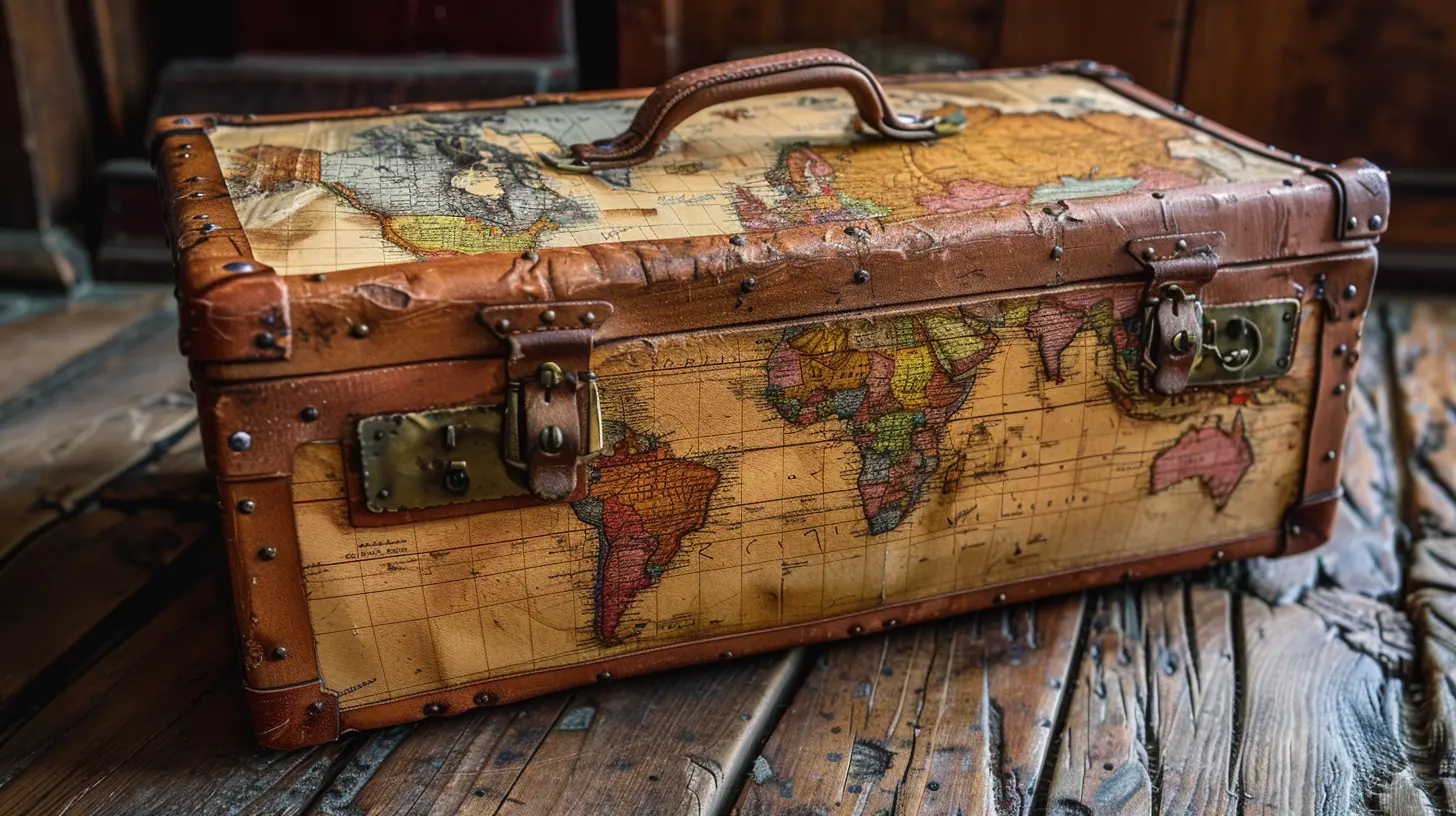How to Evaluate the True Cost of Relocation
10 December 2024
Are you considering a big move? Maybe you’ve landed your dream job in another city or just want a fresh start somewhere new. Whatever the reason, relocating can be both exciting and nerve-wracking. But here’s the catch—relocation isn’t just about packing a few boxes and hitting the road. It comes with a price tag, and not just the obvious ones. If you're not careful, those hidden expenses can sneak up on you like a cheetah chasing its prey.
So, how exactly do you evaluate the true cost of relocation without draining your savings or losing your sanity? Stick with me because we're about to break it all down, step by step, dollar by dollar.
Why Understanding Relocation Costs Is Crucial
Let’s face it—moves are expensive. Even if you're just going across town, costs can add up faster than you think. And if you’re moving to a new city or state? Forget it. Between hiring movers, buying packing supplies, and possibly putting down a deposit on a new place, it’s easy to lose track of how much you’re actually spending.But ignoring these expenses can lead to financial headaches later. Imagine finally settling into your new home only to realize you’ve maxed out your credit card. Yikes, nobody wants that. By understanding the full scope of relocation costs, you can budget accurately and avoid surprises. Think of it like planning for a holiday—you wouldn’t just show up at the airport without knowing how much the trip will cost, right?
The Key Expenses to Consider
1. Moving Costs
Let’s start with the obvious expense: moving. This is typically where most people focus their attention, and understandably so. But guess what—there’s more to it than just hiring movers.- Professional Movers: If you’re hiring professionals, get ready to spend anywhere between $800 to $5,000, depending on how far you’re moving and how much stuff you have. Long-distance moves? That can run upwards of $10,000. Gulp.
- DIY Moving: Renting a moving truck might seem like a cheaper option, but don’t forget fuel costs, insurance, and endless trips back and forth—not to mention your time and energy.
- Packing Supplies: Boxes, tape, bubble wrap, and those weirdly satisfying packing peanuts can add up. Expect to drop at least $100 to $200 here.
2. Housing Costs
Moving to a new place often means new housing expenses. And trust me, they can be downright sneaky.- Security Deposit: Renting? Be prepared to put down a security deposit, which can range from one to three months’ rent. That’s a good chunk of cash upfront.
- First and Last Month’s Rent: Some landlords ask for both right away. Double ouch.
- Utility Set-Up Fees: Moving into a new home often means setting up utilities like electricity, water, internet, and garbage collection. These fees can easily hit $200 or more.
- Temporary Housing: If there’s a gap between moving out and settling into your new place, you might need to budget for a hotel or short-term rental.
3. Travel Expenses
Are you driving across the country or flying to your new city? Either way, travel costs are a biggie.- Gas and Tolls: If you’re driving, you’ll need to budget for fuel and possibly tolls. Long drives mean more money at the pump.
- Flights: Flying? Tickets, luggage fees, and transportation to and from the airport can add up quick.
- Meals and Snacks: Don’t forget food and coffee during your journey. Nobody wants a hangry traveler.
4. Insurance Costs
You might not have considered this one, but moving often involves switching or updating your insurance policies.- Homeowners or Renters Insurance: Your old policy might not transfer to your new home, especially if you’re moving out of state.
- Auto Insurance: Some states require different levels of coverage, so your premium could go up.
- Health Insurance: If you’re switching jobs, check to see if there’s a gap in coverage or higher out-of-pocket costs.
5. Cost of Living Differences
This is where things get tricky. The cost of living in your new location might be higher—or lower—than what you're used to. Either way, it’s important to plan for the change.- Housing Prices: A bigger city typically means higher rent or mortgage payments. Do your research before you move.
- Groceries and Dining Out: The price of a latte or a loaf of bread can vary wildly depending on where you’re moving.
- Transportation: Will you need a car in your new city, or can you rely on public transit? Either way, costs will vary.
6. Miscellaneous Expenses
Here’s where the sneaky stuff comes in. These are the small, random costs that can catch you off guard.- New Furniture or Appliances: Your old couch might not fit in your new living room, or your new place might not come with a washer and dryer.
- Address Change Fees: Some governments or agencies charge for updating your address.
- Childcare and School Supplies: If you have kids, you might need to pay for new school uniforms, supplies, or even daycare while you’re unpacking.
- Pet Costs: Moving with a pet? You might need a new crate, vaccination updates, or pet-friendly accommodations along the way.
How to Plan and Budget for Relocation Costs
Now that we’ve outlined the potential costs, let’s talk about how to plan for them. Spoiler alert—it’s all about having a solid strategy.1. Create a Moving Budget
Before you even pack your first box, sit down and create a detailed moving budget. Write down every possible expense you can think of, from moving truck rentals to buying a new shower curtain. It’s better to overestimate than underestimate.2. Get Quotes
Shop around for the best deals on movers, truck rentals, and travel expenses. Don’t just accept the first quote you receive. Compare rates and read reviews. It can make a huge difference.3. Purge Unnecessary Items
The less you have to move, the cheaper it’ll be. Use this as an opportunity to declutter your life. Haven’t worn that sweater in five years? Donate it. That box of old DVDs collecting dust? Sell it. Trust me, less is more when it comes to moving.4. Set Aside an Emergency Fund
Even with the best planning, unexpected costs can pop up. Build a buffer into your budget for surprise expenses like last-minute packing supplies or repairs to your old place.5. Research Your New Area
Take time to research the cost of living in your new city or town. Websites like Numbeo or local Facebook groups can give you a sense of what to expect.
DIY vs. Professional Movers: Which Route Should You Take?
Still debating whether to hire professionals or go full DIY? Let’s break it down.- Professional Movers: Pros? They do all the heavy lifting (literally), and everything will likely arrive in one piece. Cons? The price tag can be hefty.
- DIY: Pros? It’s cheaper, and you have more control over the process. Cons? It’s time-consuming and a whole lot of work. Your back might not thank you later.
If you’re moving cross-country or have a lot of stuff, pros might be the way to go. But if you’re on a tight budget and moving a short distance, DIY could save you some serious cash.
Final Thoughts: Is Relocation Worth It?
At the end of the day, relocation is a big decision—one that comes with plenty of costs, both financial and emotional. But here’s the thing: it can also be a fresh, exciting new chapter in your life. If you take the time to evaluate all the costs ahead of time, you’ll set yourself up for a smooth transition instead of a financial disaster.So, is relocating worth it? Only you can answer that. But one thing’s for sure: now you’re armed with the knowledge to make an informed decision.
all images in this post were generated using AI tools
Category:
Cost Of LivingAuthor:

Audrey Bellamy
Discussion
rate this article
19 comments
Amalia Riggs
Relocating is more than just a change of scenery; it’s a significant financial decision. To accurately assess the true cost, consider not only moving expenses but also long-term impacts on your budget, lifestyle, and opportunities. A thorough evaluation ensures you make informed choices that align with your financial goals.
February 10, 2025 at 3:17 AM

Audrey Bellamy
Absolutely! A comprehensive evaluation of relocation costs is essential for making informed, financially sound decisions that align with your goals.
Drake Dillon
Consider hidden fees for accurate budgeting.
February 5, 2025 at 4:40 AM

Audrey Bellamy
Absolutely! Hidden fees can significantly impact your overall budget, so it's essential to account for them when evaluating relocation costs.
Chantal Hahn
Great insights! Understanding relocation costs thoroughly empowers better decision-making for a successful transition. Keep it up!
February 2, 2025 at 9:48 PM

Audrey Bellamy
Thank you! I'm glad you found the insights helpful. Understanding these costs is essential for a smooth transition!
Talia Rios
This article provides essential insights into the often-overlooked costs of relocation. From hidden fees to the emotional toll of moving, it emphasizes the importance of thorough planning. Evaluating all aspects, including potential job impacts and lifestyle changes, can help ensure a smooth transition and financial stability in your new location.
January 31, 2025 at 8:26 PM

Audrey Bellamy
Thank you for your thoughtful comment! I'm glad you found the article helpful in highlighting the crucial aspects of relocation costs and planning.
Mila Cox
Understanding the true cost of relocation empowers you to make informed decisions. Embrace the challenge, and transform potential burdens into opportunities for growth and success!
January 27, 2025 at 12:45 PM

Audrey Bellamy
Thank you! Embracing the true costs of relocation indeed opens doors to informed decision-making and personal growth. Your insights are spot on!
Blade Dorsey
This article sparked my curiosity! What hidden expenses should we be particularly cautious about when relocating?
January 24, 2025 at 5:50 AM

Audrey Bellamy
I'm glad you found the article interesting! Be cautious about costs like unexpected moving fees, utility deposits, and temporary housing expenses, as these can add up quickly.
Bennett Garcia
Moving costs: more than just boxes!
January 21, 2025 at 4:50 AM

Audrey Bellamy
Absolutely! It's crucial to factor in expenses like transportation, insurance, and time lost to get the full picture of relocation costs.
Nadia Wheeler
“Relocating? Don’t let your dreams blind you—calculate every hidden cost or prepare for buyer’s remorse!”
January 18, 2025 at 12:43 PM

Audrey Bellamy
Absolutely! It's crucial to factor in all hidden costs to avoid surprises and ensure a smooth transition.
Zayn Bowers
What a fantastic read! Your insights on evaluating relocation costs are incredibly helpful for anyone considering a move. It’s crucial to look beyond just moving expenses. Thanks for providing such valuable information to guide our decisions during this significant life change!
January 11, 2025 at 8:30 PM

Audrey Bellamy
Thank you so much for your kind words! I'm glad you found the insights helpful for your relocation decisions.
Brick Ramirez
This article effectively highlights the multifaceted nature of relocation costs, emphasizing both tangible and intangible factors. However, it could benefit from deeper insights into emotional and social implications, which often impact decision-making. A more holistic approach would empower readers to make truly informed choices about their moving endeavors.
January 8, 2025 at 5:16 AM

Audrey Bellamy
Thank you for your insightful feedback! I appreciate your suggestion to explore the emotional and social implications of relocation, and I’ll consider incorporating those aspects in future revisions to provide a more holistic perspective.
Blade Mason
Essential insights for smart relocation financial planning!
December 31, 2024 at 4:43 AM

Audrey Bellamy
Thank you! I'm glad you found the insights helpful for your relocation planning!
Tilly McPhail
Relocating can be expensive; always factor in hidden costs like moving fees, temporary housing, and potential job loss.
December 25, 2024 at 9:12 PM

Audrey Bellamy
Absolutely! Hidden costs can add up quickly. It's crucial to budget for all potential expenses to ensure a smooth relocation.
Claire Abbott
This article offers valuable insights on assessing the true cost of relocation. It emphasizes the importance of considering not just moving expenses, but also hidden costs like changes in living expenses, job impacts, and emotional factors. A holistic approach is essential for making informed relocation decisions.
December 23, 2024 at 4:57 AM

Audrey Bellamy
Thank you for your feedback! I'm glad you found the insights on evaluating both visible and hidden costs of relocation valuable. A holistic approach truly is key to making informed decisions.
Owyn Jennings
“Because moving isn’t already a financial rollercoaster, right?”
December 19, 2024 at 3:17 AM

Audrey Bellamy
Absolutely, relocating can feel like a wild financial ride! Our goal is to help you navigate those costs more effectively.
Yvette Reynolds
This article offers practical insights on assessing relocation costs. It highlights crucial factors like moving expenses, housing changes, and hidden fees, making it a valuable resource for anyone planning a move.
December 16, 2024 at 11:16 AM

Audrey Bellamy
Thank you for your feedback! I'm glad you found the insights helpful for evaluating relocation costs.
Mitchell Alexander
This article provides valuable insights into assessing relocation costs beyond just moving expenses. By considering factors like lost income and potential lifestyle changes, readers can make more informed decisions about their relocation plans.
December 14, 2024 at 4:34 AM

Audrey Bellamy
Thank you for your feedback! I'm glad you found the insights on assessing relocation costs helpful for making informed decisions.
Elena Rodriguez
Relocating isn't just about moving boxes; it's a strategic financial decision. Evaluate all costs—including hidden expenses like lost income and emotional toll—before committing. A thorough analysis ensures you aren't just chasing a change but making a wise investment in your future.
December 12, 2024 at 1:05 PM

Audrey Bellamy
Absolutely! A comprehensive evaluation of all costs, including hidden ones, is crucial for making a sound relocation decision. It's not just about the move itself, but the long-term impact on your finances and well-being.
Onyx Estes
This article succinctly highlights the multifaceted nature of relocation costs, emphasizing the need for a comprehensive financial analysis that goes beyond mere moving expenses to include long-term implications.
December 10, 2024 at 9:16 PM

Audrey Bellamy
Thank you! I'm glad you found the article insightful and appreciate your recognition of the importance of a thorough financial analysis in evaluating relocation costs.
Selah McGuffin
This article effectively underscores the multifaceted nature of relocation costs, beyond just moving expenses. It highlights the importance of considering long-term financial implications, such as changes in cost of living, potential income shifts, and lifestyle adjustments. A comprehensive analysis will ensure informed relocation decisions that align with financial goals.
December 10, 2024 at 3:49 AM

Audrey Bellamy
Thank you for your insightful comment! I'm glad you found the article helpful in highlighting the broader financial considerations of relocation beyond just moving expenses.
MORE POSTS

How to Save on Daily Commutes in an Expensive City

Common Mistakes to Avoid in Dividend Investing

How to Build a Diverse Portfolio for Retirement

How to Budget for Living in an Expensive City

Picking Undervalued Stocks: A Guide to Value Investing

The Importance of Emergency Funds When Living on Retirement Income

How Central Banks Impact Gold Prices

The Role of Cryptocurrency in Economic Freedom

Financial Survival Tips for High-Cost Cities

Breaking the Paycheck-to-Paycheck Cycle for Good

The Rise of Decentralized Autonomous Organizations (DAOs)

Ethereum 2.0 and What It Means for Decentralized Applications